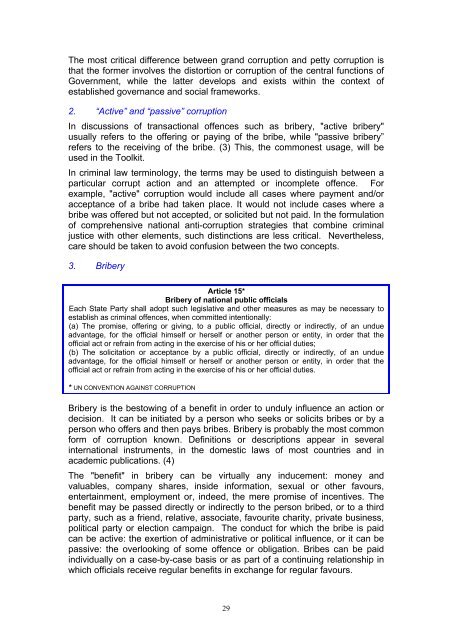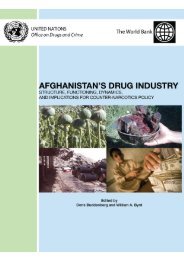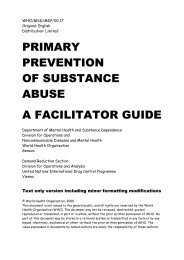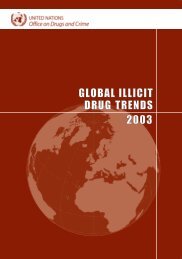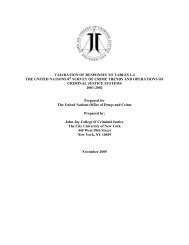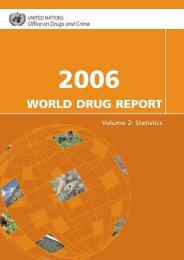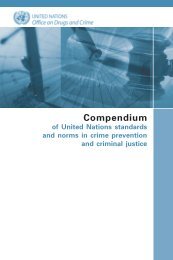UN Guide for Anti-Corruption Policies - United Nations Office on ...
UN Guide for Anti-Corruption Policies - United Nations Office on ...
UN Guide for Anti-Corruption Policies - United Nations Office on ...
You also want an ePaper? Increase the reach of your titles
YUMPU automatically turns print PDFs into web optimized ePapers that Google loves.
The most critical difference between grand corrupti<strong>on</strong> and petty corrupti<strong>on</strong> is<br />
that the <str<strong>on</strong>g>for</str<strong>on</strong>g>mer involves the distorti<strong>on</strong> or corrupti<strong>on</strong> of the central functi<strong>on</strong>s of<br />
Government, while the latter develops and exists within the c<strong>on</strong>text of<br />
established governance and social frameworks.<br />
2. “Active” and “passive” corrupti<strong>on</strong><br />
In discussi<strong>on</strong>s of transacti<strong>on</strong>al offences such as bribery, "active bribery"<br />
usually refers to the offering or paying of the bribe, while "passive bribery”<br />
refers to the receiving of the bribe. (3) This, the comm<strong>on</strong>est usage, will be<br />
used in the Toolkit.<br />
In criminal law terminology, the terms may be used to distinguish between a<br />
particular corrupt acti<strong>on</strong> and an attempted or incomplete offence. For<br />
example, "active" corrupti<strong>on</strong> would include all cases where payment and/or<br />
acceptance of a bribe had taken place. It would not include cases where a<br />
bribe was offered but not accepted, or solicited but not paid. In the <str<strong>on</strong>g>for</str<strong>on</strong>g>mulati<strong>on</strong><br />
of comprehensive nati<strong>on</strong>al anti-corrupti<strong>on</strong> strategies that combine criminal<br />
justice with other elements, such distincti<strong>on</strong>s are less critical. Nevertheless,<br />
care should be taken to avoid c<strong>on</strong>fusi<strong>on</strong> between the two c<strong>on</strong>cepts.<br />
3. Bribery<br />
Article 15*<br />
Bribery of nati<strong>on</strong>al public officials<br />
Each State Party shall adopt such legislative and other measures as may be necessary to<br />
establish as criminal offences, when committed intenti<strong>on</strong>ally:<br />
(a) The promise, offering or giving, to a public official, directly or indirectly, of an undue<br />
advantage, <str<strong>on</strong>g>for</str<strong>on</strong>g> the official himself or herself or another pers<strong>on</strong> or entity, in order that the<br />
official act or refrain from acting in the exercise of his or her official duties;<br />
(b) The solicitati<strong>on</strong> or acceptance by a public official, directly or indirectly, of an undue<br />
advantage, <str<strong>on</strong>g>for</str<strong>on</strong>g> the official himself or herself or another pers<strong>on</strong> or entity, in order that the<br />
official act or refrain from acting in the exercise of his or her official duties.<br />
* <str<strong>on</strong>g>UN</str<strong>on</strong>g> CONVENTION AGAINST CORRUPTION<br />
Bribery is the bestowing of a benefit in order to unduly influence an acti<strong>on</strong> or<br />
decisi<strong>on</strong>. It can be initiated by a pers<strong>on</strong> who seeks or solicits bribes or by a<br />
pers<strong>on</strong> who offers and then pays bribes. Bribery is probably the most comm<strong>on</strong><br />
<str<strong>on</strong>g>for</str<strong>on</strong>g>m of corrupti<strong>on</strong> known. Definiti<strong>on</strong>s or descripti<strong>on</strong>s appear in several<br />
internati<strong>on</strong>al instruments, in the domestic laws of most countries and in<br />
academic publicati<strong>on</strong>s. (4)<br />
The "benefit" in bribery can be virtually any inducement: m<strong>on</strong>ey and<br />
valuables, company shares, inside in<str<strong>on</strong>g>for</str<strong>on</strong>g>mati<strong>on</strong>, sexual or other favours,<br />
entertainment, employment or, indeed, the mere promise of incentives. The<br />
benefit may be passed directly or indirectly to the pers<strong>on</strong> bribed, or to a third<br />
party, such as a friend, relative, associate, favourite charity, private business,<br />
political party or electi<strong>on</strong> campaign. The c<strong>on</strong>duct <str<strong>on</strong>g>for</str<strong>on</strong>g> which the bribe is paid<br />
can be active: the exerti<strong>on</strong> of administrative or political influence, or it can be<br />
passive: the overlooking of some offence or obligati<strong>on</strong>. Bribes can be paid<br />
individually <strong>on</strong> a case-by-case basis or as part of a c<strong>on</strong>tinuing relati<strong>on</strong>ship in<br />
which officials receive regular benefits in exchange <str<strong>on</strong>g>for</str<strong>on</strong>g> regular favours.<br />
29


